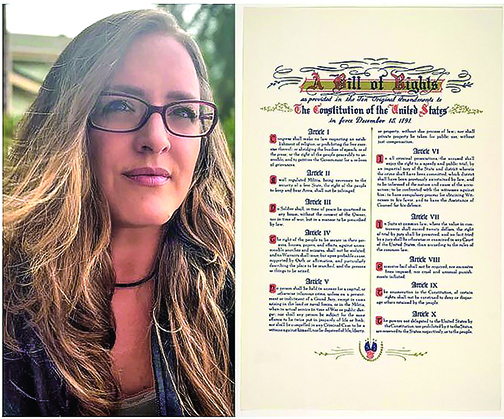ASHE IN AMERICA — OPINION
There are 22 states with 14th Amendment, Section 3 challenges to President Trump’s 2024 candidacy. Six states — Florida, Colorado, New Hampshire, Minnesota, Michigan, and Rhode Island — have declined to prevent President Trump from being on the ballot.
Other challenges underway have yet to be decided: Alaska, Arizona, Connecticut, Delaware, Kansas, Massachusetts, Montana, New Jersey, New Mexico, New York, South Carolina, Texas, Vermont, Virginia, West Virginia, Wisconsin, and Wyoming.
In Colorado, District Judge Sarah Wallace issued a criminal finding in a civil trial, prompting President Trump to appeal the judge’s seemingly favorable ruling. On December 6, 2023, the Colorado Justices heard arguments in the case from Jason Murray and Eric Olsen for the petitioners, and Scott Gessler for the intervenors.
There were two matters before the court:
- Does Section 3 of the 14th Amendment apply to the President?
- Was January 6 an insurrection?
Most of the time was devoted to the 14th Amendment with minimal time being devoted to the nature of January 6. There was extensive discussion about Confederate President Jefferson Davis; a tacit comparison of January 6 to the Civil War, which is appalling when you really think about it.
The biggest concern for Colorado Republican voters in this case is the matter of equal treatment. That is, if President Trump is allowed on the ballot across the nation, but not in Colorado, are Republican voters truly able to participate in the election. On this, Eric Olsen declared that President Trump is disqualified, because Judge Wallace said so, and that President Trump’s inclusion on the ballot would dilute the votes of Republicans.
“We’re worried about our clients, who are Republicans and Independents who filed the suit because they want a fair shot in the Republican primary to vote for a qualified candidate and have their support for a qualified candidate not be diluted through votes for a candidate who would definitely be disqualified,” Olsen said. “The pro-democracy, pro-Colorado voter perspective, which is, I think, what we’re looking at here” is to declare Trump ineligible before election, “so that the ballot reflects those who are qualified, and the will of the voter can be honored.”
Hearing Eric Olsen pretend to care about the rights of Republican voters, while unapologetically engaging in election interference against the most popular Republican candidate — by a wide margin — was particularly nauseating.
For his part, Scott Gessler briefly argued that J6 is more “properly categorized” as “a riot” than an “insurrection.” Unfortunately, one of the justices stated that, because Gessler didn’t brief the court on counter arguments about the insurrection, they don’t have much to go on, to dispute the District Court’s ruling.
My heart sank at this exchange, particularly because the insurrection findings were the entire reason for President Trump’s appeal. The Justice seemed to be implying that Gessler had dropped the ball on making the argument, and that may be enough wiggle room for the high court to uphold Wallace’s flawed decision.
What are the potential outcomes? There are several, and the case is expected to be appealed all the way to the United States Supreme Court.
For the 14th Amendment, if the court upholds Judge Wallace’s determination that Section 3 of the 14th doesn’t apply to the President, then the petitioners will likely appeal.
For the matter of insurrection, if the court upholds Judge Wallace’s finding that Trump engaged in insurrection, President Trump and the GOP will likely appeal.
There is also the possibility that they will uphold one part of the ruling and overturn the other. For example, uphold that J6 was an insurrection and that President Trump incited it — and overturn Judge Wallace’s decision that the 14th Amendment doesn’t apply to the President. Simply, they could decide to keep President Trump off the ballot.
Alternatively, the CO Supreme Court could uphold the 14th Amendment ruling but overturn the findings about insurrection. In my view this is the right call, but I am not holding my breath in the Colorado courts.
The appeals will move quickly. According to Secretary Griswold’s posted election timeline, citing Colorado statutes 1-4-1204(1.5) and 1-1-106(5), December 29 is the “Last day a person whose name has been certified to be placed on the ballot of the March 5th Presidential Primary.”
Stay tuned.
Ashe Epp is a writer and activist. You can find all her work at Linktree.com/asheinamerica

